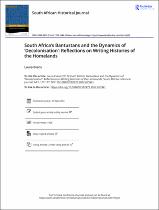| dc.contributor.author | Evans, Laura | |
| dc.date.accessioned | 2023-03-03T10:01:59Z | |
| dc.date.available | 2023-03-03T10:01:59Z | |
| dc.date.issued | 2012 | |
| dc.identifier.citation | Evans, L. (2015). South Africa’s Bantustans and the dynamics of “decolonisation”: Reflections on writing histories of the homelands. South African Historical Journal, 64 (1) , 117-137. https://doi.org/10.1080/02582473.2012.655941 | en_US |
| dc.identifier.issn | 1726-1686 | |
| dc.identifier.uri | https://doi.org/10.1080/02582473.2012.655941 | |
| dc.identifier.uri | http://hdl.handle.net/10566/8526 | |
| dc.description.abstract | From the late 1950s, as independent African polities replaced formal colonialrule in Africa, South Africa’s white minority regime set about its own policy ofmimicry in the promotion of self-governing homelands, which were to beguided to full ‘independence’. Scholarly study of South Africa’s homelands hasremained largely apart from accounts of decolonisation in Africa. Aninterpretation of South Africa’s exceptional political path in the era of Africandecolonisation that has dominated the literature has meant that importantdebates in African history, which might helpfully illuminate the South Africancase, have been neglected. In seeking inspiration for new histories of thehomelands, this article looks beyond South Africa’s borders to processes of anddebates on decolonisation in Africa. | en_US |
| dc.language.iso | en | en_US |
| dc.publisher | Taylor and Francis Group | en_US |
| dc.subject | Decolonisation | en_US |
| dc.subject | Apartheid | en_US |
| dc.subject | Gender | en_US |
| dc.subject | Politics | en_US |
| dc.subject | South Africa | en_US |
| dc.title | South Africa’s Bantustans and the dynamics of “decolonisation”: Reflections on writing histories of the homelands | en_US |
| dc.type | Article | en_US |

